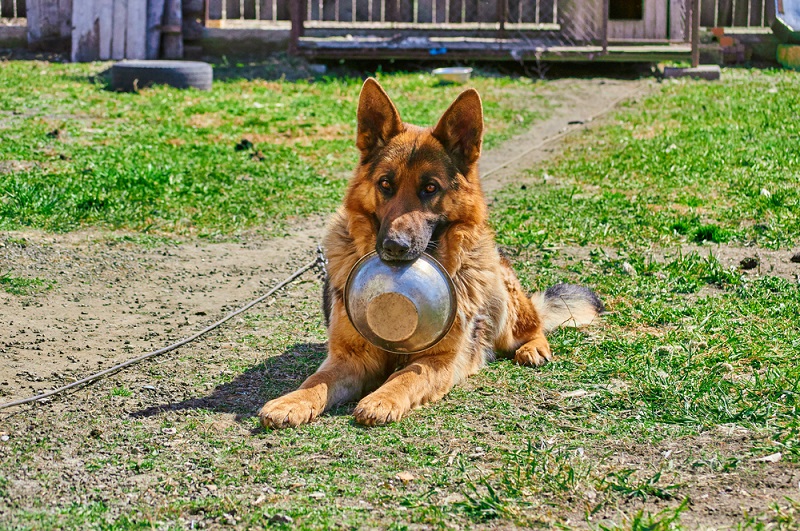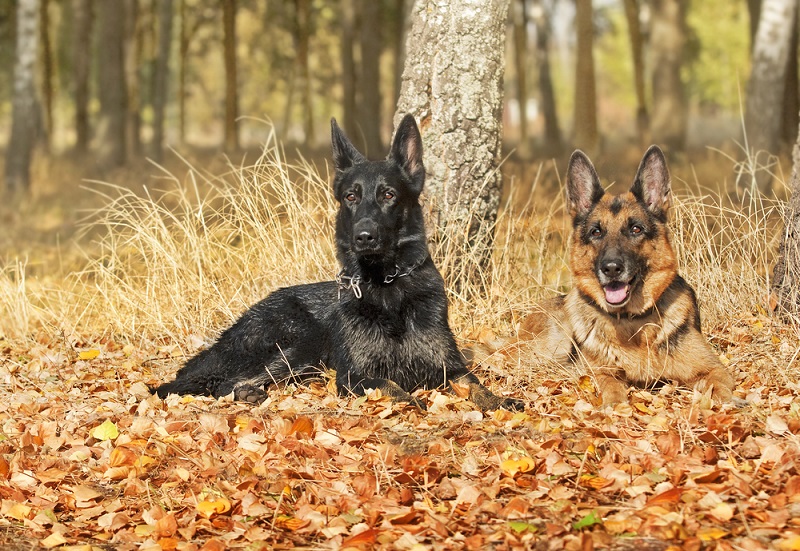Updated March 19, 2024
When America first fell in love with German Shepherd movie star Rin Tin Tin in 1922,1 the breed was only three decades old in the eyes of the American Kennel Club.2 Today, this brave, intelligent, and loyal dog is one of the world’s most recognizable dog breeds and the AKC’s second-most popular.
The German Shepherd is also a reliable police and military dog. In fact, a German Shepherd is currently serving as the U.S.’s “First Dog”—Major, the Bidens’ youngest dog, can often be seen playing on the grounds of the White House.
It’s easy to see why these friendly giants are so lovable. If you’re hoping to adopt a German Shepherd, this guide covers everything you need to know.
A Brief History of the German Shepherd Breed
Credit for the standardization of the German Shepherd dog breed goes to Max Emil Friedrich von Stephanitz.3 In 1899, while he was an officer in the German cavalry, the Dresden native began breeding a variety of herding dog types in his quest to develop a breed with the character, endurance, and mental stability to serve humans.
In 1907, the German Shepherd was introduced to America at an open class dog show in Newcastle, Pennsylvania. By 1913, the mighty canine won its first championship, and that same year, the German Shepherd Dog Club of America was founded. Two years later, the club held its first specialty show in Greenwich, Connecticut.
Formerly Known As…
When the United States entered World War I in 1917, anything associated with Germany became unpopular. For this reason, the AKC altered the name of the breed to Shepherd Dog and the German Shepherd Dog Club dropped the “German” from its title. In Europe, the name of this large breed was changed to Alsatian. In 1930, the AKC restored the breed’s original designation.
All About the German Shepherd Breed
Lauded as “dogkind’s finest all-purpose worker” by the AKC, the breed is defined by its gracefully curved outline and easy natural gait. As smart or smarter than virtually any other breed, this steadfast guardian can learn numerous commands and carry them out without flinching.
Appearance
This working dog breed grows up pretty quickly. 18 months is usually when German Shepherds stop growing, but they’re quite large even as puppies. Per the AKC, the typical adult German Shepherd reaches 22-26 inches tall at the shoulder and weighs between 65 and 90 pounds. Males are taller and heavier than females.
With medium-length fur, the coarse, double-coat of the German Shepherd comes in several standard colors and color combinations:
- Black
- Black & Cream
- Black & Red
- Black & Silver
- Black & Tan
- Blue
- Gray
- Liver
- Sable
- White
- Bi-Color
Most coat colors are acceptable in AKC conformation rings, but liver is considered less desirable and white is disqualifying. It’s also worth noting that competition dogs must have black noses to qualify for AKC competition.
German Shepherds do shed, so before adopting one, be sure you have the time and means to invest in regular grooming (and don’t forget to stock up on lint rollers). Aside from taking care of their coat, you should also take care of their skin. Common German Shepherd skin issues include yeast dermatitis, moist dermatitis, and allergy dermatitis. Fortunately, using the right hair care products can help prevent skin issues in dogs—check out Vetericyn’s hair care products ideal for dog fur.
Temperament
Fiercely loyal, the German Shepherd will give its all to defend his or her owner. As such, these gentle giants make affectionate yet protective family pets. Plus, with the right dog training, they’re capable of performing more serious jobs, such as working with the military or police.
In fact, as members of the herding group, German Shepherds love to use their brains and are best fulfilled when they have a job to do.
While they’re highly trainable, they’re also known for their loud bark, so be mindful of your proximity to your neighbors and their tolerance for noise.
German Shepherds also need ample daily exercise—more than just a daily walk. In fact, many need upwards of two hours per day.4 For this reason, their ideal home is one with a yard where they can run freely throughout the day.
German Shepherds on the Job
Agile, intelligent, and brave, the German Shepherd dog breed is well known for its propensity for hard work. Although training and temperament matter more than breed, German Shepherds are often selected to perform specific tasks, such as:
- Airscenting
- Cadaver dogs
- Disaster response
- Mobility assistance
- Psychiatric service
- Search and rescue (SAR)
- Tracking
- Trailing
- Water recovery
Even if your German Shepherd’s primary job is “family pet” or “guard dog,” there are ways to keep them mentally stimulated. For instance, you can try enrolling your German Shepherd in a canine sport or hobby. Some of the best ones for German Shepherds include5:
- Herding
- Obedience/Rally
- Agility
- Tracking
- Schutzhund (performing tasks they might have to as a military or police dog)
Participating in a sport will not only be fulfilling for your dog—it will also help keep them physically and mentally active.
Care and Feeding of the German Shepherd
As mentioned, German Shepherds need a lot of exercise. It’s essential for them to get the “zoomies” out each day, ideally through a combination of walks, sports, play sessions, and running freely in the yard. With all of this activity, it’s also important that they maintain a healthy and nutritious diet.
To best support your German Shepherd, let’s explore their exercise and diet requirements below.
Exercise Requirements
German Shepherds are highly energetic animals that require more than just walks to remain healthy and happy. Mental stimulation is necessary, as well. Bored, under-stimulated dogs are prone to develop behavioral problems, including digging, chewing, and excessive barking.6
Fortunately, there are a number of activities and games you can share with your Shepherd that combine physical and mental stimulation.
- Try to log a long walk (45 minutes to an hour) at least a few times a week
- Consider taking your dog along on longer hikes or runs (or even having them run alongside you while you bike)
- Implement training for a sport like agility or herding. This serves as both physical and mental exercise (as does training for obedience school)
Can German Shepherds Swim?
Unlike the Labrador Retriever and Golden Retriever,7 the German Shepherd don’t have webbed feet, and they’re not naturally inclined to jump in the water and swim. Nonetheless, you may train your Shepherd to enjoy aquatic sports, especially if you start in still water when your dog is young.

What to Feed Your German Shepherd
Adult Shepherds should never eat puppy chow, as it can lead to obesity—even in highly active dogs. Cheap kibble is not a wise choice either, especially when it comes to quality. German Shepherds are athletic animals who do best when provided high-quality foods, adequate exercise, and plenty of fresh drinking water.
How much food you should feed your Shepherd each day depends on their size, age, and activity level, but it should generally be divided into two or three meals daily. Consult your vet about your pet’s individual calorie needs to determine the right amount of dog food for them (you can also use an online calculator to get a rough estimate in the meantime).8
Additionally, always watch your dog, not their food bowl, to determine if they’re eating the right amount of dog food. If you notice your pet becoming overweight, limit high-calorie treats and table scraps (which should only make up about 10% of their daily calories).9
Health Issues Common to the German Shepherd Breed
When it comes to German Shepherds’ common health issues, the less inbreeding, the better. As long as they remain healthy, the average German Shepherd lifespan can reach 10 to 12 years. The top health issues suffered by this large breed are joint problems and hip dysplasia (when the hip joints are not a perfect fit, eventually causing arthritis).
Per the People’s Dispensary for Sick Animals (PDSA), other German Shepherd health issues include:
- Elbow dysplasia
- Canine Degenerative Myelopathy (DM), which progressively weakens and eventually paralyzes the back legs
- Anal furunculosis (ulcers)
- Inherited eye diseases, like cataracts and retinal dysplasia
- Epilepsy
- Pituitary dwarfism (a hormone deficiency causing growth issues that can limit the lifespan)
- Hemophilia A and B (stops blood from clotting)
Be sure to take your pet to the vet for their regular physical to screen for these common German Shepherd health issues. They can also benefit from doing exercises for dogs with arthritis.
Whether intended to be a service dog or companion animal, it’s important to obtain your German Shepherd from a reputable breeder. Provided adequate exercise, high-quality food, regular vet visits, and plenty of love, the German Shepherd Dog can be the best friend you ever had.
Keep Your German Shepherd Thriving with ALL-IN
Once you’ve adopted your new best friend, you’ll stop at nothing to keep them happy and healthy. Luckily, you can rest easy knowing you’re giving your German Shepherd’s overall wellness a daily boost with Vetericyn’s ALL-IN multifunctional supplement.
ALL-IN is like the ultimate multivitamin for dogs—its all-natural ingredients include digestive enzymes, beetroot powder, collagen, biotin, a 5-mushroom blend, and more. No matter what you’re looking for, there’s something to support every aspect of your pup’s health.
Stock up today to see for yourself.
 Reviewed by C. Scott Van Winkle
Reviewed by C. Scott Van Winkle
Scott has been with Innovacyn for the past 11 years and has been working within the Burlingame portfolio of companies for the past 23 years. Scott brings a diverse background to Innovacyn. With an upbringing as the 5th generation on his families cattle ranch, Scott has a passion for animal health and the continuous improvement surrounding agricultural practices. Scott earned marketing and business management degrees from the University of Idaho and holds an Executive MBA from Pepperdine University.
Sources:
- Rin Tin Tin. https://www.imdb.com/name/nm0863833/
- American Kennel Club. German Shepherd Dog. https://www.akc.org/dog-breeds/german-shepherd-dog/?_ga=2.119829896.1410953510.1708963949-1799325991.1708543933
- German Shepherd Dog Club of America (GSDCA). Breed History. https://www.gsdca.org/breed-history/
- People’s Dispensary for Sick Animals (PDSA). German Shepherd. https://www.pdsa.org.uk/pet-help-and-advice/looking-after-your-pet/puppies-dogs/large-dogs/german-shepherd
- American Kennel Club (AKC). The Best Sports to Do With Your German Shepherd Dog. https://www.akc.org/expert-advice/lifestyle/the-best-sports-to-do-with-your-german-shepherd-dog/
- American Kennel Club (AKC). Bored Dogs: How to Recognize and Solve Doggy Boredom. https://www.akc.org/expert-advice/training/bored-dogs-how-to-recognize-doggy-boredom-and-help/
- University of Idaho. Labrador Retrievers. https://www.lib.uidaho.edu/digital/objects/guidedreading/guidedread049.pdf
- The Ohio State University, Veterinary Medical Center. Best Calorie Calculator for Dogs and Cats. https://vet.osu.edu/vmc/companion/our-services/nutrition-support-service/basic-calorie-calculator
- Tufts University. How much should I feed my dog or cat? https://vetnutrition.tufts.edu/2016/02/how-much-should-i-feed-my-dog-or-cat/
